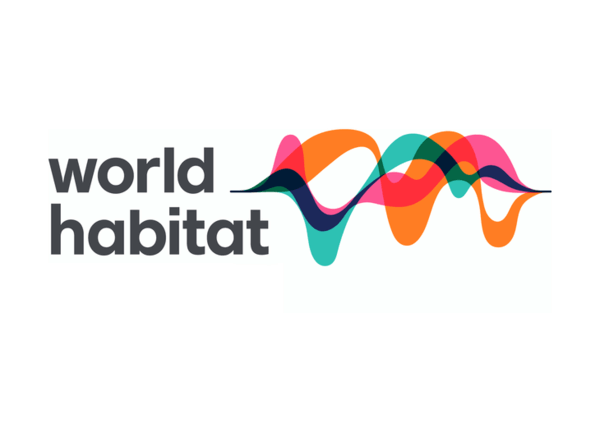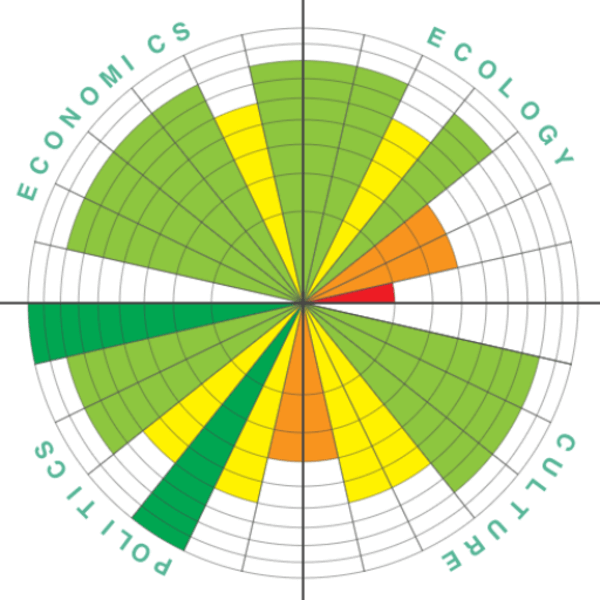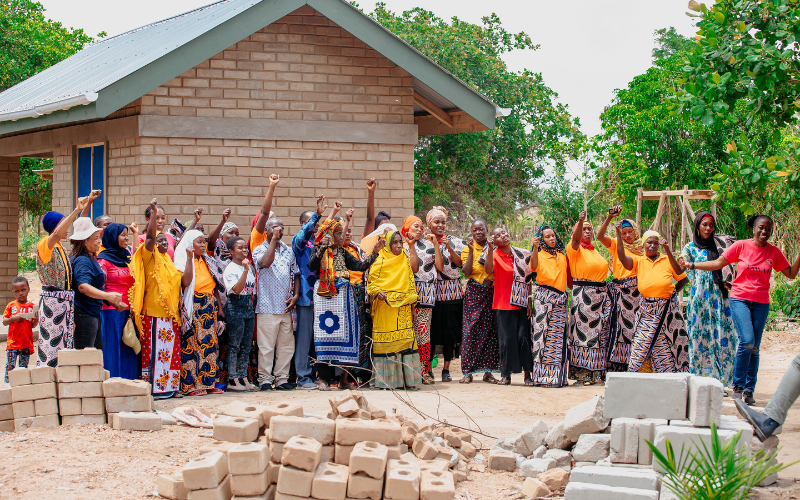 Celebrating New Building - © Tanzania Women Architects for Humanite (TAWA)
Celebrating New Building - © Tanzania Women Architects for Humanite (TAWA)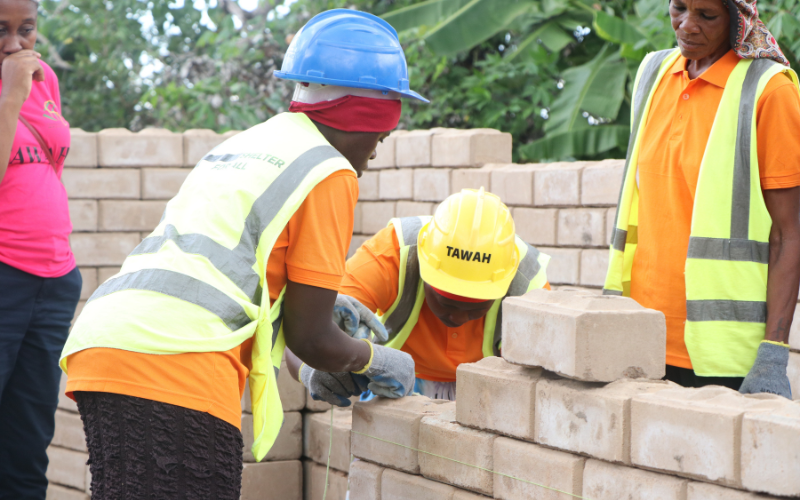 Women building a wall - © Tanzania Women Architects for Humanite (TAWA)
Women building a wall - © Tanzania Women Architects for Humanite (TAWA)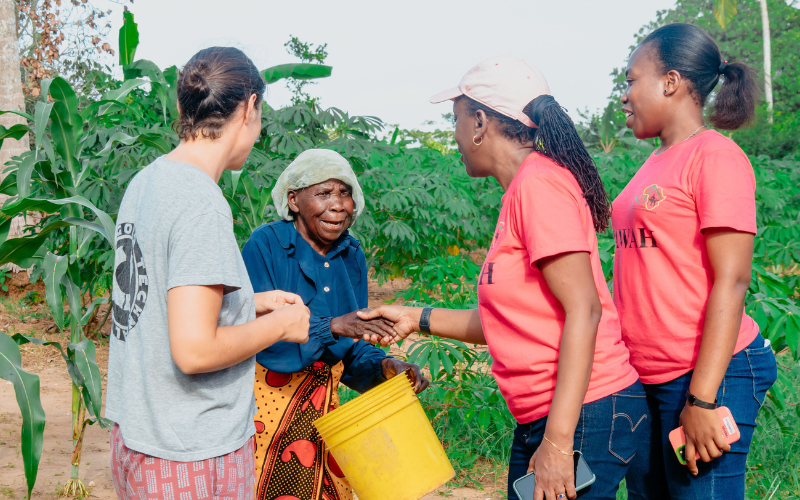 Meeting residents on the farm - © Tanzania Women Architects for Humanite (TAWA)
Meeting residents on the farm - © Tanzania Women Architects for Humanite (TAWA)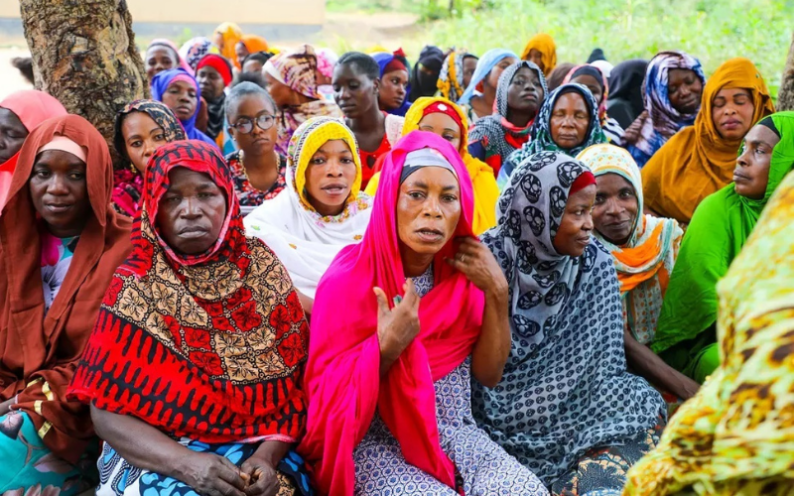 Communal Focus Meeting - © Tanzania Women Architects for Humanite (TAWA)
Communal Focus Meeting - © Tanzania Women Architects for Humanite (TAWA)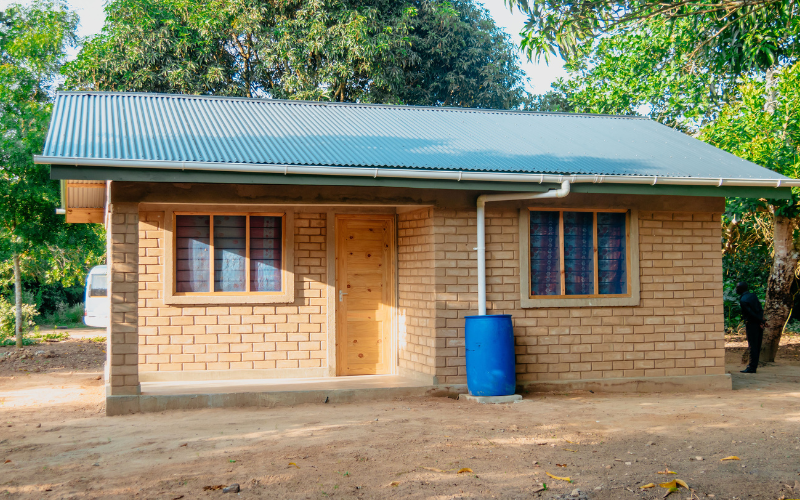 New Building - © Tanzania Women Architects for Humanite (TAWA)
New Building - © Tanzania Women Architects for Humanite (TAWA)
City
Dar es Salaam
Main actors
NGO / Philanthropy, Community / Citizen Group, Research Institutes / Universities, Private Sector
Project area
Neighborhood or district
Duration
Ongoing since 2021
Housing poverty is widespread in Tanzania, with many lacking access to decent homes due to poverty and limited knowledge of affordable building methods. This is particularly the case for women-led households and the elderly in rural areas, who often live in poor conditions, face age-related challenges and don’t have a support system. Despite these difficulties, many elderly Tanzanians own land, offering a way for community-driven housing solutions to take shape.
Tanzania Women Architects for Humanity (TAWAH) addresses housing poverty and gender inequality in rural Tanzania. Their project in Mhaga village empowers women by teaching them new skills, supporting their development and investing in their communities.
With TAWAH’s help, they learn how to make bricks from soil, are taught construction techniques, are helped to start micro businesses and set up to join the work force. At the same time, the trainees build homes for the elderly, using locally available materials and sustainable practices to create environmentally friendly and affordable housing.
The project involves the community and fosters collaboration with local authorities, university students, and volunteers, which is changing attitudes towards gender equity and housing justice.
Full project summary originally published by World Habitat Awards.
World Habitat Awards
This project was awarded the 'World Habitat Awards' in 2025 in the following category: Gold prize.
The aim of the project is to equip communities -especially women- with the technical skills to lead the construction of high-quality shelters, combating housing poverty across Tanzania and achieving a better gender balance in the construction sector.
The project aims to:
• Ensure the well-being of elders.
• Provide communities with the necessary skills for housing construction.
• Teach sustainable brick-making techniques using local soil.
The project benefits:
• Elderly residents of the village, who get access to safe and secure homes.
• Female residents from the village, who are trained in construction.
• Secondary school students, who are invited to take part in activities such as soil testing, brick making, and safety training, or by collaborations aimed at addressing environmental issues within their school.
• University students from Lund University (Sweden) and Zanzibar University who visit the centre to learn and work with women on the production of earth bricks.
• Volunteers, who are female university students registered in the TAWAH volunteering programme for one year. They are actively involved in various activities, from design work to construction activities and office management.
The project has a strong focus on sustainability in order to reduce construction costs, minimise long-term maintenance costs and enhance the project's scalability to other communities. TAWAH’s aim is to replicate the project across Tanzania.
TAWAH pioneer’s sustainable solutions for low-cost housing, using locally available materials to minimize environmental impact and promote economic resilience. To achieve this vision, the organisation developed a training centre in Mhaga village. The training centre educates women to become builders, and the construction of homes for the elderly is part of the wider training programme developed there.
TAWAH's rapport with the community of Mhaga Village began in 2019 with the construction of a girls' secondary school. This positive collaboration led to the generous donation of a five-acre plot of land by the villagers. As the school project progressed, TAWAH turned its attention to the village's housing situation, particularly the needs of marginalised elders.
Launched in November 2021, the project has already constructed six homes, providing secure housing for six individuals. Six additional homes are currently under construction. The impact extends beyond these homes, having benefitted an additional 342 people through skills development programmes.
Through the project, vulnerable and marginalised elders are given safe and secure homes that meet their physical and social needs. The trained women attain highly marketable skills with the potential to earn a good income, improve their own homes, and are encouraged to form new social and economic networks amongst other trainees. Those involved are also educated on protecting the environment, helping to minimise damage to the biosphere and climate. In this way, the project addresses problems of housing poverty, age and gender inequality, social marginalisation, economic hardship and environmental degradation.
The approach is collaborative and community-centred:
• Local government authorities play a vital role in project implementation and community engagement, ensuring the project is aligned with the needs and priorities of the community.
• Community involvement is at the heart of the approach, from initial survey and selection of beneficiaries to design and construction phases. Community meetings are held to gather input on project design and ensure that interventions reflect local preferences.
• Students visit the project regularly to learn about innovative
• Close collaboration and communication are maintained with project funders, ensuring transparency, accountability, and mutual understanding of project objectives and progress.
• Representatives from partner organisations (universities, media, and other organisational allies) are engaged in ‘building days’ on site, presentations, and annual project evaluation visits.
• Elders play a crucial role in their housing projects. While their physical contributions may be lighter, their lived experiences provide invaluable insights that shape the design process. Elders may offer storage space for materials or share local knowledge. Additionally, their families and neighbours often assist with physically demanding tasks like site clearing and foundation digging. Prioritising the needs of the elderly and enhancing their quality of life significantly influences the approach taken on housing design. Homes are not just aesthetically pleasing, but practically relevant. This translates to features like natural light and ventilation for optimal indoor climate, ramps for easy navigation, and thoughtfully planned layouts that encourage movement and social interaction.
• Facilities such as pit latrines, cooking areas and rainwater storage are located outside the homes. Additionally, there is space for hosting visitors, acknowledging the importance of maintaining social connections and fostering a sense of community among elderly residents. • Central to the approach is the use of compressed interlocking soil bricks, produced on-site by women builders. This not only reduces production costs but also provides women with valuable skills and knowledge about soil suitability for brickmaking, which they can apply to improve their own homes.
The lead agency for the project is TAWAH. Tanzania Women Architects for Humanity (TAWAH) was formed in June 2010 by a group of Tanzanian women architects and engineers committed to enhancing social justice. TAWAH was registered as a non-governmental organisation in 2011.
The project cost $107,000 USD, with funding secured until 2026 during which time another six houses will be built (making 12 in total). TAWAH relies on a combination of grants, donors, and fundraising events. It is also supported by a variety of partners including ITV Media, Zanzibar University, Tanzania Commercial Bank and the Building Research Institute.
To ensure long-term sustainability, the organisation is exploring various income-generating activities, including;
- offering accredited fee-paying courses
- additional support for women’s construction cooperatives
- the sale of earth bricks
- and using 10 acres of recently acquired land to grow organic produce.
Financial:
The project has a positive impact on the local economy, generating income and employment opportunities not only for women but also for other community members involved in the project.
By providing training in low-cost and sustainable construction techniques, the project has not only equipped women with valuable skills but also created employment opportunities that contribute to their economic independence and well-being. Twenty women who have been trained to an advanced level are now employed as skilled workers, working on the construction of other community projects or employed at the centre.
The project facilitates land ownership for the elderly population. For instance, in one case, a widow without children was living on land owned by her brother-in-law. To ensure tenure security and enable housing construction, village leaders convened a meeting with the landowner. Following discussions, the land was subdivided, and full ownership was transferred to the beneficiary through village title deeds, which were prepared and signed by village leaders. This is a crucial prerequisite before any construction begins and ensures that elderly individuals have legal ownership and secure tenure of the land where their homes are constructed, thereby safeguarding their housing rights.
Beyond direct beneficiaries, the project impacts the families of the women trainees, ranging from nuclear families to extended relatives. The training stipend, averaging approximately $2.5 USD per day, has empowered trainees to set up a credit group known as 'Mhaga Women Builders.' They have opened a collective bank account and now provide each other with loans, facilitating home improvements and fostering a sense of community support. Families have also begun collaborating to produce construction materials for their new homes, with women taking on supervisory roles.
Social:
TAWAH fosters collaboration with local government leaders, including District Commissioners, to raise awareness of their interventions. This collaboration allows them to advocate for resources that benefit women, such as loans for home improvements or starting businesses. Additionally, TAWAH is compiling impact stories for a workshop with stakeholders in housing and community development. This workshop aims to raise awareness of community support for elders and promote the benefits of decent, low-cost housing. Ultimately, TAWAH seeks to influence changes to policy on housing and the welfare of elders in Tanzanian communities.
By directly addressing housing challenges faced by elders, the project has enhanced their quality of life and fostered a sense of dignity and security for vulnerable members of the community.
The project has also had a positive impact on students, volunteers, and other visitors. The partnership with two secondary schools aims to influence teaching curricula. University students have the opportunity to gain experience in innovative construction methods and community development, gaining knowledge and skills that can be applied in their future careers. Volunteers contribute their time and expertise, fostering a sense of community engagement. Visitors experience the positive impact of the project firsthand, inspiring them to become advocates for social change and sustainable development.
Other residents with financial resources and a growing appreciation for using local resources, such as earth-based bricks, are expressing interest in replicating the model to enhance their own housing conditions.
Environmental
• The project prioritizes the use of compressed earth bricks. Bricks are made reusing soil excavated for the foundation of homes, reducing the need to buy and transport building materials, reducing embodied energy and minimizing environmental impact.
• A wastewater recycling plant was constructed at TAWAH’s Vocational centre, serving as a learning platform for the community on recycling wastewater from public facilities like schools and hospitals. The water produced from this plant is used for farm irrigation, reducing the strain on natural water resources and promoting sustainable agricultural practices. Rainwater harvesting and storage is a key element of all homes constructed through the project.
• There is a commitment to reforestation and increasing greenery. The community and visitors are actively engaged in tree planting and gardening activities, with each visitor asked to plant a tree. Over the past three years, a total of 140 shading and fruit trees have been planted, contributing to biodiversity and environmental sustainability.
• The project promotes environmental awareness and education among elders and community members. Before handing over the homes, elders are provided with flowers, trees, and grasses to plant, fostering a sense of environmental stewardship and sustainability.
• The centre uses solar lights and is in the process of installing a solar water pump. Movable solar lights were purchased for three of the elder beneficiaries, and the project is actively seeking funds to invest in a more durable and powerful solar system.
• Waste sorting practices are implemented at the TAWAH Vocational Center, teaching recycling to trainees.
Women in rural Tanzania can often find themselves trapped in poverty, economically reliant on men to sustain themselves and their families and unable to afford to send their children to school. Some female elders are affected by physical and financial challenges and live in unsafe and unhealthy conditions. They don’t have opportunities to improve their living conditions or livelihoods. The construction industry in Tanzania, as in most countries, is highly male dominated, but it offers huge untapped economic and social opportunities for women.
The project was originally inspired by the Women's Opportunity Centre in Kayonza, in Rwanda and the brick making technology that has existed in Tanzania since the 1970s.
There is much curiosity and a desire to be inspired and learn more about the homes for the elderly beyond Tanzania’s borders. Lund University students from Sweden visit each semester, and international interest in the project has prompted TAWAH to publish materials, ensuring wider dissemination of their efforts and knowledge.
To achieve its vision of decent shelter for all, TAWAH plans to take the project to other places across the country, with a focus on using locally available materials. For example, in the Mbeya region, bamboo is a readily available material ideal for housing construction. The long-term goal is to set up satellite training centres in at least four regions of Tanzania. This is dependent on TAWAH’s ability to secure future funding.
TAWAH’s training centre serves the most remote regions of Tanzania, due to its accommodation facilities which allow women from far and wide to participate in the programme. This in turn helps to embed new skills and knowledge throughout the country as ex-students promote and support change in their communities. They share their knowledge and skills with others upon returning home, spreading the benefits of low-cost housing and their increased earning potential to a wider audience.
External links / documents
On Map
The Map will be displayed after accepting cookie policy
